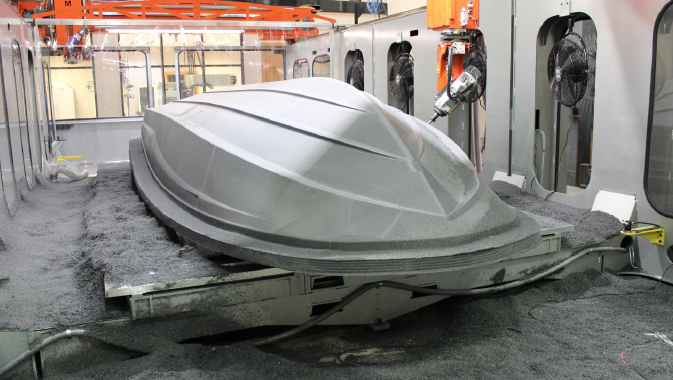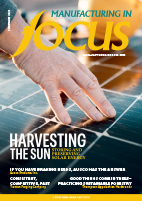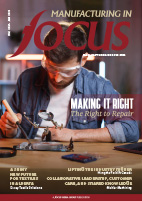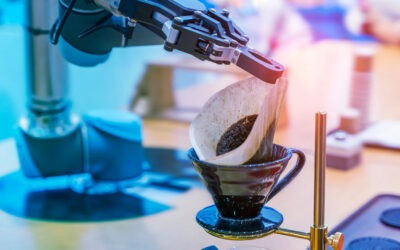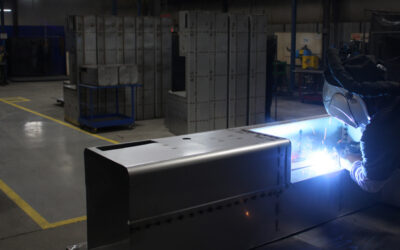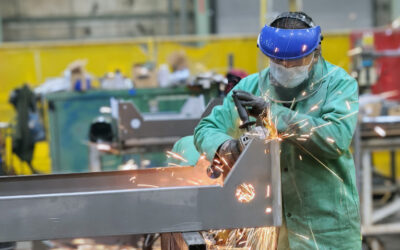Thermwood Corporation began business in 1969 by coming up with a process to thermoform wood grain plastics. These molded components were primarily used in the furniture industry in the 1970s. The company jumped into the creation of computer numerically controlled (CNC) machines when it began manufacturing CNC routers to work with non-ferrous materials such as wood, plastics, and composites. A few years ago, it entered the three-dimensional (3D) printing and additive manufacturing sector and developed a full, large-scale additive manufacturing system that both prints and machines a product using a single piece of equipment.
~
“Since the beginning, at Thermwood, not only do we manufacture our own machines, we also manufacture and engineer our own controller that drives the machine,” says Thermwood Corporation Vice President of Marketing Jason Susnjara. “There are very few companies today that do this. A lot of them will use a commercial control, but we use our own control, which basically allows us to update and add new features to the life of everyone’s machine.”
Today, Thermwood employs approximately 115 staff members. The company is headquartered in the town of Dale, Indiana. Dale has a population of less than 2,000 people and is thirty minutes south of Jasper, Indiana, which is known as the ‘Wood Capital of the World’ for the many woodworking companies and furniture companies in operation there. This culture spreads to the community and the residents, creating a uniquely talented workforce.
“The people that we bring in – our employees – are generally very hardworking individuals. A lot of them come from the farming communities around here, and farmers are good at working with their hands and almost have an engineering-type mind. Whether they’re working on the floor or in the office, they have a lot of great ideas that they bring to the company,” says Jason.
Thermwood has one Vice President of Sales and three other internal salespeople who handle dealers throughout the world. One person is in charge of the international dealers across eighty countries, and the rest of the team focuses on the twelve dealers within the United States. Its customers range anywhere from small, start-up companies to Fortune 500 businesses. Thermwood uses the same machine building process for companies of all sizes in a variety of industries including woodworking, plastics, automotive, aerospace, military defense, and marine.
The two original types of CNC routers made by Thermwood are three-axis machines and five-axis machines, and these are sold primarily to the woodworking, aerospace, marine, automotive, plastics and military/defense industries. The CNC router sales are growing steadily from new customers as well as from existing customers that are upgrading or buying more machines to keep up with growth. The company’s Large Scale Additive Manufacturing (LSAM) machine is a significant product that has brought in a whole new clientele and attracted even larger companies than it was capable of serving before.
The journey into additive manufacturing began when the company took part in machining the first 3D-printed car. The process sparked interest within its research and development team. Two years ago, Thermwood created the technology to build a large-scale 3D printer for thermoplastic polymers that could make larger parts than those made by the usual process.
The LSAM was designed for additive manufacturing of large components intended for industrial production, and it has brought the company further success. “We’re putting a lot of emphasis on this product for future growth with new materials, new ideas on printing, and faster throughput with the hopes of reducing customers’ costs by fifty to seventy percent,” says Jason.
In 2014 it won a prestigious award for its Cut Center machine, a self-programmed CNC router that custom makes closets, furniture, and more. The quality of the product was recognized at the International Woodworking Fair with the ‘Challengers Award.’
The basic mechanics of a machine from one company to another are all relatively the same, yet there are ways in which one company can separate itself from the competition. Thermwood uses the best materials it can and always makes sure to use U.S. steel, but it mostly differentiates itself on the technical and software side with the development of its own controller. The controller allows it to provide updates and new features when they become available while extending the life of the machine.
“We make sure that our machines are rock solid and that they will last, and on top of that, one of our biggest features is not just the machine itself but it’s actually our service and support that comes after the machine is sold,” says Jason. “We have a very well-organized service and support department with roughly thirteen to fifteen tech service people that run throughout the US and globally, supporting our machines and helping our customers out whenever they have any issues.”
Thermwood is one of the very few companies that offer free phone support for the life of the CNC machine. Its customers are always able to call with questions or concerns, and if they are having any immediate issues, the support team attempts to solve the problem through a virtual service network right away.
“They can connect their machine to our computers here, and we can run some diagnostic tests through the internet before we actually have to send someone out, and a lot of times we can actually fix their issues over the phone instead of having to send someone out, which saves them a little bit of money,” says Jason.
For its 3D printing, Thermwood mainly uses a plastic-based material with a certain percentage of carbon fiber mixed in, and that percentage depends on what type of product is being printed. After an item has been printed, that item can be broken into pellets which can then be used again. However, every time a plastic goes through the heating and cooling process, there are properties of that plastic that are lost. When using what is called the regrind material, only a small percentage can be mixed with the virgin material so as to retain the integrity of the outcome.
Since the recession in 2008, numerous foreign-made CNC routers have been imported into the U.S. and sold for about a third of the price of competing products, which is the largest challenge for Thermwood and other CNC companies. “Our U.S. CNC competitors have seen the same thing. These machines come in at a very low price, and it is now almost considered a commodity-type product to a lot of these smaller shops. They can buy a machine for thirty thousand dollars that kind of looks like one of our machines where we sell on average for eighty to one hundred thousand dollars,” says Jason.
Recently, Thermwood issued a joint press release with Boeing stating a new partnership. Thermwood’s LSAM machine was used to fabricate a one-piece, twelve-foot-long tool for the aerospace company using its vertical layer print technology. As Thermwood continues to gain experience with 3D printing, it hopes to continue developing partnerships that drive its growth.

